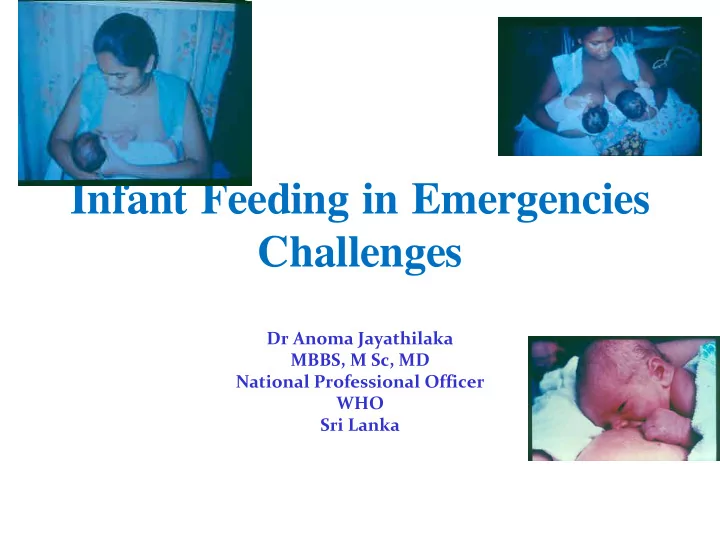

Infant Feeding in Emergencies Challenges Dr Anoma Jayathilaka MBBS, M Sc, MD National Professional Officer WHO Sri Lanka
Common concerns • Malnourished mothers can not breast feed • The mother think she is not able to produce enough milk • Stress prevent milk production
IFE 1/8 Challenges for breastfeeding Mothers’ difficulties • time constraints long time to fetch water, queue for food • lack of protection, security, and (where valued) privacy • lack of social support and the familiar social network • free availability of breastmilk substitutes,undermining mothers’ confidence in breastfeeding
Benaco Camp UNICEF/94-0069/Howard Davies Benaco Camp, Tanzania IFE 1/9
IFE 1/10 Household in camp near Goma, Zaire/Congo UNICEF-D0194-0285/Betty Press
• In appropriate donation of milk food
“ Although Sri Lanka is a country with a high exclusive breastfeeding rate, there was a myth among mothers about the inability to produce enough breastmilk when under stress. A major problem was the distribution of infant formula and feeding bottles by donors and NGOs without the appropriate controls to breastfeeding mothers. Donors acted emotionally without any scientific basis, disregarding the dangers of artificial feeding in disasters. Additionally the mass media was very keen on feeding babies so made a public appeal to supply artificial milk and feeding bottles. There was also some difficulty in getting appropriate complementary food to mothers post tsunami. The ministry of health faced many challenges to ensure that breastfeeding mothers continued to do so and did not swap to unsustainable and potentially dangerous infant formula.” Statement from the Sri Lankan Ministry of Health after the 2004 Indian Ocean Tsunami M. Corbett, Indonesia, 2006 Although Sri Lanka is a country with high exclusive breast feeding status
IFE 1/13 Some important points from the International Code of Marketing of Breastmilk Substitutes • no advertising or promotion to the public • no free samples to mothers or families • no donation of free supplies to the health care system • health care system obtains breast milk substitutes through normal procurement channels, not through free or subsidised supplies • labels in appropriate language, with specified information and warnings
IFE 1/16 How to protect, promote and support breastfeeding • Emphasise that breast milk is best. • Actively support women to breastfeed. • Avoid inappropriate distribution of breast milk substitutes. • When necessary, use infant formula if available . HONDURAS. UNICEF/HQ98-0639/BULAGUER RWANDA. UNICEF/DOI94-1056/PRESS NGARA, TZ/LUNG’AHO
IFE 1/17 More How to protect, promote and support breastfeeding • Do not distribute feeding bottles/teats; promote cup feeding. . Add complementary foods to breastfeeding at about 6 months. • Include pregnant and lactating women in supplementary feeding when general ration is insufficient. EX-Yugoslavia UNICEF/HQ-95-0505/LEMOYNE
EXAMPLE OF EXTRA FOOD NEEDED EACH DAY BY A BREAST FEEDING WOMAN 60 g rice (1 fistful) 240 Calories 30 g dhal (1/2 fistful) 120 Calories Vegetables (1 fistful) ½ banana 90 Calories 5 ml oil (1 teaspoonful) 50 Calories
Recommend
More recommend